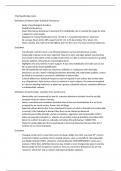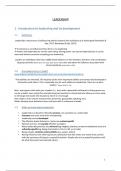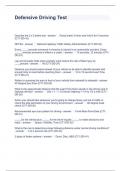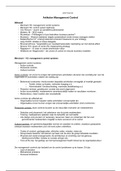`Psychopathology notes
Definitions of Abnormality: statistical infrequency
- Study of psychological disorders
Statistical infrequency
- States that human behaviour is abnormal if its statistically rare or outside the range for what
is typical for most people.
- Displayed on normal distribution curve, 5% fall at +-2 standard deviations= abnormal
- IQ: average IQ set at100, 68% range from 85-115. 2.5% have below 70 or above 115.
- Mean, median and mode all at the highest point on the curve, the most common behaviour.
Evaluation
- Cut off point: useful to have a cut off point between normal and abnormal, creates
measurable criterion so its more objective. May be to strict and rigid, patient may feel they
must reach to the extent of the standard where they are able to achieve treatment e.g eating
disorder patients, ethical issues, psychological harm.
- Highlights who may need to receive support: if you show statistically rare traits such as low
IQ can get help for learning difficulties.
- Not all statistically rare traits are abnormal: definition is inadequate when desirable
behaviours are rare. Doesn’t distinguish between desirable and undesirable qualities, cannot
be relied on to provide a conclusive a definition of abnormality
- Cultural differences: statistical frequency may be frequent in one culture but not the other
e.g schizophrenia, claim to hear voices is common in some cultures. No universal standards
or rules for labelling behaviour as abnormal. Ignores collectivist cultures, symptoms different
in individualistic cultures
Definitions of Abnormality: deviation from social norms
- Abnormality can b measured by how far a persons behaviour deviates from the socially
accepted norms or values of society
- Norms: unwritten and sometimes unstated rules of how we should behave if w are to be
accepted by our social society. Govern lots of things.
- Approach allows abnormality to be understood in terms of what is desirable and undesirable
in society. If the individual is deviant then they can be classed as abnormal
- Antisocial personality disorder: person is impulsive, aggressive and irresponsible. DSM-5
states an important symptom is ‘ absence of normative internal standards associated with
failure to conform to lawful or culturally normative ethical behaviour’ SUBJECTIVE.
- Make the social judgement that a psychopath is abnormal behaviour because they don’t
conform to our moral standards.
Evaluation
- Changing social norms: social norms are not always stable over time. E.g early 20 th century
unmarried mothers would be sent to mental asylums, seen as mentally ill. Homosexuality
was illegal until late 1900’s, classed as a mental disorder. ERA DEPENDENCY, norms are a
product of their time, definition becomes less reliable s more changes take place in society.
Allows people to feel accepted in society as views on uncommon behaviours etc are not
classed as ‘abnormal’ and so reduces individuals prejudice opinions.
, - Not all behaviour is abnormal: model does distinguish between desirable and undesirable
behaviour unlike SI definition. Social deviancy model also takes into account the effect
behaviour has on others. Not all behaviour that deviates from social norms is also
psychologically abnormal, e.g shocking dress codes in youths but don’t have psychological
issues. Most socially deviant behaviour does not indicate psychological abnormality.
- Definition is subjective: open to interpretation which means what one person could class as
abnormal another may not. In comparison to SI definition despite its flaw its very objective
and every person would have same outcome according to the definition. Deviation definition
is reductionist.
Definitions of Abnormality: deviation from ideal mental health
- Normal mental health can be defined like normal physical health, a set of criteria can be
established to measure ideal mental health. If we possess these criteria, we are able to live a
contented existence and pursue optimal living, the absence of these criteria will indicate
abnormality
- Marie Jahoda: suggested six criteria that would constitute ideal mental health. In order to be
classified as normal then you must posses all 6
1) Self attitudes: having high self esteem and a strong sense of identity
2) Personal growth and self actualisation: the extent to which an individual develops his or
her full capabilities
3) Integration: being able to cope with stressful situations
4) Autonomy: being independent and self regulating
5) Having an accurate perception of reality
6) Mastery of the environment: including ability to love, function at work and in
interpersonal relationships, adjust to new situations and solve problems
Evaluation
- Challenging to achieve: the ‘ideals’ makes them difficult for most people to achieve, to
achieve 6/6 on a daily basis is ambitious and very challenging to achieve, with these
standards most people will be defined as abnormal. Focuses on what’s desirable rather than
what’s undesirable, aiming to achieve self-actualisation is a positive concept, aiming to be
the best version of yourself.
- Broad range of concepts: Jahoda’s definition covers broad range of criteria, covers most
reasons why a person might seek out mental health services, useful tool for thinking about
mental health and maybe the catalyst for someone to seek support. Still difficult to say
whether someone is normal or abnormal, loses clarity and diagnosis difficult to apply.
Subjective criteria, depends on what the individual believes as being ideally healthy, who has
the right to declare if your normal or not
- Cultural relativism: reaching self actualisation is relevant in individualistic cultures but not
collectivist, focus on group role. May find higher abnormality in other cultures, cannot be
generalised
Definitions of Abnormality: failure to function adequately
- Identifies abnormality by examining the individuals thoughts and behaviour from their own
point of view. Assumes w can recognise that we have stopped living a ‘normal’ life, stopped
experiencing range of normal emotions or not participating in normal activities. Inability to
cope with life, work and relationships, reached point of DYSFUNCTION
Definitions of Abnormality: statistical infrequency
- Study of psychological disorders
Statistical infrequency
- States that human behaviour is abnormal if its statistically rare or outside the range for what
is typical for most people.
- Displayed on normal distribution curve, 5% fall at +-2 standard deviations= abnormal
- IQ: average IQ set at100, 68% range from 85-115. 2.5% have below 70 or above 115.
- Mean, median and mode all at the highest point on the curve, the most common behaviour.
Evaluation
- Cut off point: useful to have a cut off point between normal and abnormal, creates
measurable criterion so its more objective. May be to strict and rigid, patient may feel they
must reach to the extent of the standard where they are able to achieve treatment e.g eating
disorder patients, ethical issues, psychological harm.
- Highlights who may need to receive support: if you show statistically rare traits such as low
IQ can get help for learning difficulties.
- Not all statistically rare traits are abnormal: definition is inadequate when desirable
behaviours are rare. Doesn’t distinguish between desirable and undesirable qualities, cannot
be relied on to provide a conclusive a definition of abnormality
- Cultural differences: statistical frequency may be frequent in one culture but not the other
e.g schizophrenia, claim to hear voices is common in some cultures. No universal standards
or rules for labelling behaviour as abnormal. Ignores collectivist cultures, symptoms different
in individualistic cultures
Definitions of Abnormality: deviation from social norms
- Abnormality can b measured by how far a persons behaviour deviates from the socially
accepted norms or values of society
- Norms: unwritten and sometimes unstated rules of how we should behave if w are to be
accepted by our social society. Govern lots of things.
- Approach allows abnormality to be understood in terms of what is desirable and undesirable
in society. If the individual is deviant then they can be classed as abnormal
- Antisocial personality disorder: person is impulsive, aggressive and irresponsible. DSM-5
states an important symptom is ‘ absence of normative internal standards associated with
failure to conform to lawful or culturally normative ethical behaviour’ SUBJECTIVE.
- Make the social judgement that a psychopath is abnormal behaviour because they don’t
conform to our moral standards.
Evaluation
- Changing social norms: social norms are not always stable over time. E.g early 20 th century
unmarried mothers would be sent to mental asylums, seen as mentally ill. Homosexuality
was illegal until late 1900’s, classed as a mental disorder. ERA DEPENDENCY, norms are a
product of their time, definition becomes less reliable s more changes take place in society.
Allows people to feel accepted in society as views on uncommon behaviours etc are not
classed as ‘abnormal’ and so reduces individuals prejudice opinions.
, - Not all behaviour is abnormal: model does distinguish between desirable and undesirable
behaviour unlike SI definition. Social deviancy model also takes into account the effect
behaviour has on others. Not all behaviour that deviates from social norms is also
psychologically abnormal, e.g shocking dress codes in youths but don’t have psychological
issues. Most socially deviant behaviour does not indicate psychological abnormality.
- Definition is subjective: open to interpretation which means what one person could class as
abnormal another may not. In comparison to SI definition despite its flaw its very objective
and every person would have same outcome according to the definition. Deviation definition
is reductionist.
Definitions of Abnormality: deviation from ideal mental health
- Normal mental health can be defined like normal physical health, a set of criteria can be
established to measure ideal mental health. If we possess these criteria, we are able to live a
contented existence and pursue optimal living, the absence of these criteria will indicate
abnormality
- Marie Jahoda: suggested six criteria that would constitute ideal mental health. In order to be
classified as normal then you must posses all 6
1) Self attitudes: having high self esteem and a strong sense of identity
2) Personal growth and self actualisation: the extent to which an individual develops his or
her full capabilities
3) Integration: being able to cope with stressful situations
4) Autonomy: being independent and self regulating
5) Having an accurate perception of reality
6) Mastery of the environment: including ability to love, function at work and in
interpersonal relationships, adjust to new situations and solve problems
Evaluation
- Challenging to achieve: the ‘ideals’ makes them difficult for most people to achieve, to
achieve 6/6 on a daily basis is ambitious and very challenging to achieve, with these
standards most people will be defined as abnormal. Focuses on what’s desirable rather than
what’s undesirable, aiming to achieve self-actualisation is a positive concept, aiming to be
the best version of yourself.
- Broad range of concepts: Jahoda’s definition covers broad range of criteria, covers most
reasons why a person might seek out mental health services, useful tool for thinking about
mental health and maybe the catalyst for someone to seek support. Still difficult to say
whether someone is normal or abnormal, loses clarity and diagnosis difficult to apply.
Subjective criteria, depends on what the individual believes as being ideally healthy, who has
the right to declare if your normal or not
- Cultural relativism: reaching self actualisation is relevant in individualistic cultures but not
collectivist, focus on group role. May find higher abnormality in other cultures, cannot be
generalised
Definitions of Abnormality: failure to function adequately
- Identifies abnormality by examining the individuals thoughts and behaviour from their own
point of view. Assumes w can recognise that we have stopped living a ‘normal’ life, stopped
experiencing range of normal emotions or not participating in normal activities. Inability to
cope with life, work and relationships, reached point of DYSFUNCTION











